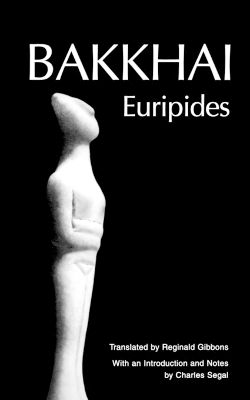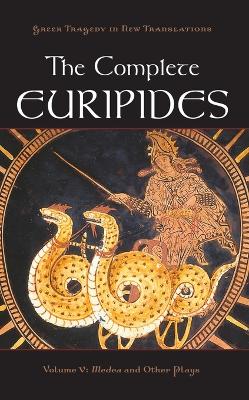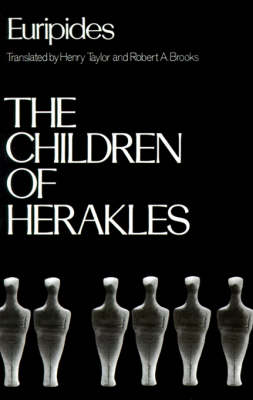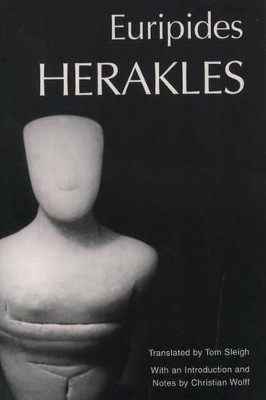The Greek Tragedy in New Translations
24 total works
Euripides' Bakkhai is the staple of the canon of Greek tragedy and is required or strongly recommended reading for most undergraduate Classics majors. It also surfaces quite often in non-classics courses focusing on tragedy because its structure and thematics offer exemplary models of the classic tragic elements. The plot of Bakkhai centers around the actions of Pentheus, King of Thebes, who refused to recognise the god Dionysus or permit Thebans to
worship him. In revenge, Dionysus drove Pentheus mad, made him cross-dress as a maenad, sent him to worship the god he had spurned, and made his mother, Agave, mistake him for a wild beast and rip him to shreds. Gibbons, a prize-winning poet, and Segal, a renowned classicist, are both leaders in their professions and
are well-suited to take on this central text of Greek tragedy. This edition includes an introduction, a new translation, notes on the text, and a glossary.
worship him. In revenge, Dionysus drove Pentheus mad, made him cross-dress as a maenad, sent him to worship the god he had spurned, and made his mother, Agave, mistake him for a wild beast and rip him to shreds. Gibbons, a prize-winning poet, and Segal, a renowned classicist, are both leaders in their professions and
are well-suited to take on this central text of Greek tragedy. This edition includes an introduction, a new translation, notes on the text, and a glossary.
Based on the conviction that only translators who write poetry themselves can properly re-create the celebrated and timeless tragedies of Aeschylus, Sophocles, and Euripides, the Greek Tragedy in New Translations series offers new translations that go beyond the literal meaning of the Greek in order to evoke the poetry of the originals.
This volume collects Euipides' Alcestis (translated by William Arrowsmith), a subtle drama about Alcestis and her husband Admetos, which is the oldest surviving work by the dramatist; Medea (Michael Collier and Georgia Machemer), a moving vengeance story and an excellent example of the prominence and complexity that Euripides gave to female characters; Helen (Peter Burian), a genre breaking play based on the myth of Helen in Egypt; and Cyclops (Heather McHugh
and David Konstan), a highly lyrical drama based on a celebrated episode from the Odyssey. This volume retains the informative introductions and explanatory notes of the original editions and adds a single combined glossary and Greek line numbers.
This volume collects Euipides' Alcestis (translated by William Arrowsmith), a subtle drama about Alcestis and her husband Admetos, which is the oldest surviving work by the dramatist; Medea (Michael Collier and Georgia Machemer), a moving vengeance story and an excellent example of the prominence and complexity that Euripides gave to female characters; Helen (Peter Burian), a genre breaking play based on the myth of Helen in Egypt; and Cyclops (Heather McHugh
and David Konstan), a highly lyrical drama based on a celebrated episode from the Odyssey. This volume retains the informative introductions and explanatory notes of the original editions and adds a single combined glossary and Greek line numbers.
One of the shortest plays in Greek drama, The Children of Herakles offers enough action for two or three plays of normal length. But this very richness and complexity have made the play elusive, subject to dismissive readings, and extraordinarily difficult to translate; in consequence, it has suffered from neglect over the ages. This vibrant new translation makes clear that The Children of Herakles is actually a wonderfully well-crafted work of art, a play offering a wealth of rewards to the modern reader.
It is a play about war and the effects of war within the state. Herakles, the legendary hero cursed from birth, was never permitted a triumphant homecoming. Here, his descendants continue the effort to return home, seeking asylum from the persecution of the king who had imposed on Herakles the famous twelve labors. While it pursues concepts of deep moral grandeur, it ends with a denouement of astonishing physical and ethical brutality, and affords Euripides a severe comment on what he believed was the decline of the Athenian character.
It is a play about war and the effects of war within the state. Herakles, the legendary hero cursed from birth, was never permitted a triumphant homecoming. Here, his descendants continue the effort to return home, seeking asylum from the persecution of the king who had imposed on Herakles the famous twelve labors. While it pursues concepts of deep moral grandeur, it ends with a denouement of astonishing physical and ethical brutality, and affords Euripides a severe comment on what he believed was the decline of the Athenian character.
In Herakles, Euripides reveals with great subtlety and complexity the often brutal underpinnings of our social arrangements. The play enacts a thoroughly contemporary dilemma about the relationship between personal and state violence to civic order . Of all of Euripides' plays, this is his most skeptically subversive examination of myth, morality, and power. The play depicts Herakles being driven mad by Hera, the wife of Zeus. Hera hates Herakles because he is one of Zeus' children born of adultery. In his madness, Herakles is driven to murder his own wife and children, and he eventually exiles himself to Athens. The volume includes a new translation, an introduction, notes on the text, and a glossary.



